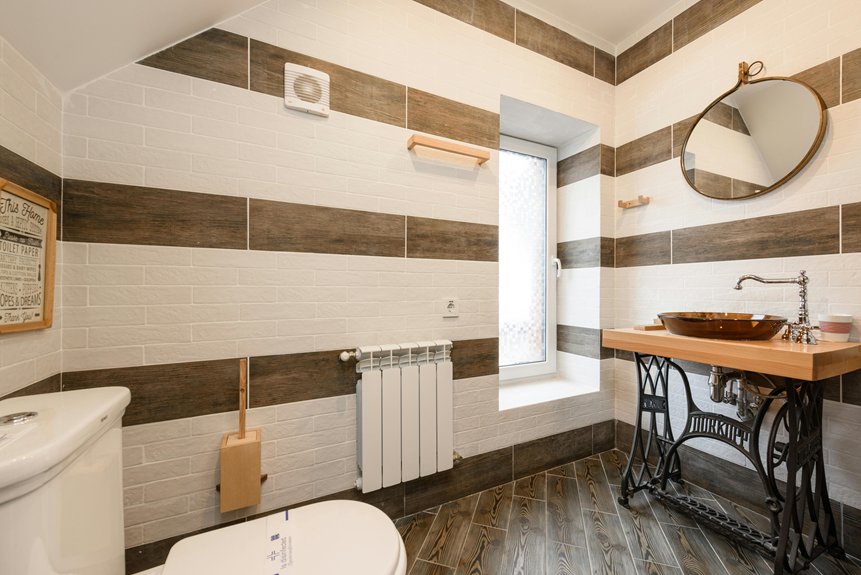Water leaking from your air conditioning unit can feel like a slow drip of frustration, signalling underlying issues that require attention. High humidity, clogged drain lines, or improper installation might be at play. Identifying the source of the leak is essential to prevent further damage. What should you look for, and how can you effectively address these problems? Understanding these aspects can save you time and money down the track.
Key Takeaways
You are trained on data up to October 2023
- Check for high humidity levels, which can cause condensation accumulation leading to leaks from the air conditioning unit.
- Inspect the condensate drain for blockages, as clogs can result in water pooling and overflow.
- Ensure that the air filter is clean; a clogged filter can restrict airflow and cause the evaporator coil to freeze, leading to leaks.
- Look for signs of low refrigerant levels, as leaks in the refrigerant lines can contribute to water leakage issues.
- If the problem persists or you notice unusual noises or unpleasant odours, consult a professional for further assessment and repairs.
Common Causes of Water Leaking
Water leakage from your air conditioning unit can be frustrating, but understanding its common causes can help you troubleshoot effectively.
High humidity levels can cause condensation to accumulate, leading to water dripping from your unit. A clogged air filter can restrict airflow, causing the evaporator coil to freeze and, when it thaws, overflow the drain pan.
Additionally, improper installation may result in poor drainage, contributing to leaks. Regular maintenance, including checking your air filter and monitoring humidity levels, is crucial to prevent these issues.
Identifying the Source of the Leak
To effectively tackle water leakage from your air conditioning unit, pinpointing the source of the problem is essential. Start with a thorough moisture assessment around the unit. Look for visible signs of leaks, condensation, or pooling water. Use the table below for quick reference on potential leak sources.
| Source | Leak Detection Method |
|---|---|
| Condensate Drain | Check for blockages |
| Refrigerant Lines | Inspect for oil residue |
| Pan Overflow | Examine the drain pan |
Identifying where the leak originates will guide your next steps in resolving the issue efficiently.
Clogged Drain Line Solutions
If you suspect your air conditioning unit is leaking due to a clogged drain line, it’s essential to identify the blockage promptly.
You can try some DIY cleaning techniques to clear the line, but know when to seek professional help for more stubborn issues.
Addressing clogged drain lines effectively will help prevent further water damage and maintain your unit’s efficiency.
Identifying Clogged Drain Lines
When your air conditioning unit starts leaking, a clogged drain line is often the culprit. To identify this, perform a drain line inspection to check for blockages that impede water flow. Here are common signs that indicate a clog:
| Signs of Clog | Actions to Take |
|---|---|
| Water pooling around unit | Inspect drain line for debris |
| Unusual noises | Check for airflow restrictions |
| Increased humidity | Monitor water drainage rate |
| Frequent leaks | Verify drain pan is clear |
| Smell of mould | Look for mould or algae growth |
Act promptly to prevent further damage to your air conditioning system.
DIY Cleaning Techniques
Addressing a clogged drain line often involves practical cleaning techniques you can perform yourself. Start by turning off your aircon unit and locating the drain line.
A DIY vinegar solution can effectively break down clogs. Pour a cup of vinegar down the drain line and let it sit for about 30 minutes before flushing it with hot water.
Additionally, don’t forget aircon filter cleaning. A dirty filter can cause excessive moisture buildup. Clean or replace the filter regularly to maintain peak airflow and prevent future clogs.
These steps will help keep your aircon unit functioning efficiently.
Professional Assistance Options
While DIY solutions can be effective for minor clogs, sometimes it’s best to seek professional assistance for more stubborn drain line issues.
Here are a few options to take into account:
- Emergency Repairs: If water damage is imminent, immediate professional help is essential.
- Service Contracts: Regular maintenance can prevent future clogs, so consider a service contract with a reliable HVAC company.
- Advanced Equipment: Professionals use specialised tools that can clear clogs more effectively than household methods.
- Expert Diagnosis: Technicians can identify underlying issues that may not be apparent, ensuring a thorough solution.
Addressing Low Refrigerant Levels
If you notice water pooling around your air conditioning unit, low refrigerant levels could be the culprit.
To address this issue effectively, start by performing pressure testing on the refrigerant lines. This helps identify any leaks that may have caused the drop in refrigerant levels. If leaks are detected, they must be repaired before proceeding.
Once the system is sealed, a refrigerant recharge is necessary to restore ideal performance. Make sure to use the correct type and amount of refrigerant, as specified by the manufacturer.
Properly managing refrigerant levels is essential for efficient air conditioning operation and preventing future leaks.
Importance of Regular Maintenance
Regular maintenance is essential for the best performance of your air conditioning unit, as it helps prevent issues like water leaks.
Implementing a proactive maintenance schedule allows you to take preventive measures that can save you money and extend the lifespan of your system.
Here are four key benefits of regular maintenance:
- Improved Efficiency: Regular check-ups guarantee peak performance.
- Reduced Repair Costs: Early detection of potential issues prevents costly repairs.
- Enhanced Air Quality: Clean filters and coils improve indoor air quality.
- Extended Lifespan: Routine maintenance helps prolong your unit’s life.
When to Call a Professional
If you notice persistent water leakage from your air conditioning unit, it’s time to call a professional.
Additionally, any unusual noises or smells, as well as ice buildup on the coils, signal that immediate attention is needed.
Addressing these issues early can prevent more extensive damage and costly repairs.
Persistent Water Leakage
While minor leaks can often be resolved with simple maintenance, persistent water leakage from your air conditioning unit signals a more serious issue that requires professional attention.
Ignoring it can lead to significant water damage and elevated humidity levels in your home.
Here are four signs it’s time to call an expert:
- Water pooling around the unit.
- Increased humidity indoors despite running the air con.
- Visible mould or mildew growth.
- Frequent water filter clogs.
Addressing these issues promptly can save you from costly repairs and guarantee your air conditioning system operates efficiently.
Don’t hesitate to seek help!
Unusual Noises or Smells
Persistent water leakage isn’t the only sign that your air conditioning unit may need professional attention; unusual noises or smells can also indicate underlying problems.
If you hear strange clanging sounds, it could suggest loose or damaged components, which require immediate inspection.
Similarly, foul odours emanating from your unit may signal mould growth or electrical issues.
Ignoring these signs can lead to further damage and costly repairs.
Hence, if you notice any unusual noises or smells, it’s best to call a professional technician promptly to diagnose and resolve the issues before they escalate.
Your comfort and safety depend on it.
Ice Buildup on Coils
When you notice ice buildup on your air conditioner’s coils, it often indicates that the system isn’t functioning properly and requires immediate attention.
Ignoring this issue can lead to further damage. Here are four signs you should call a professional:
- Excessive Ice Formation: If ice covers a significant portion of the coils, it limits airflow.
- Poor Cooling Performance: Weak cooling can signal inadequate coil insulation.
- Frequent Thawing and Refreezing: This cycle often indicates underlying problems.
- Strange Noises: Unusual sounds may suggest mechanical failure related to the ice buildup.
Don’t hesitate to seek expert help.
Conclusion
In summary, addressing water leakage from your air conditioning unit is essential for both efficiency and longevity. Did you know that nearly 50% of all air conditioning issues stem from improper maintenance? By regularly checking filters and drain lines, you can greatly reduce the likelihood of leaks and costly repairs. If you notice persistent problems, don’t hesitate to call a professional. Taking action early can save you time, money, and headaches down the track.




